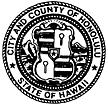
Labor and repair costs
threaten water price hikeThe Honolulu Board of Water
Supply eyes a 2005 rate increase
Oahu water bills will likely go up in 2005 to offset rising costs for labor, electricity and replacement of aging pipelines.
"I think we've deferred the rate increases to a point where we're looking at our projections, and clearly it's not going to be possible for us to defer any further rate increase down the road," said Clifford Jamile, Honolulu Board of Water Supply manager.
After holding off on raising rates for eight years, the board is projecting the need for a "moderate" rate increase beginning in January 2005, in the range of 3 to 6 percent, Jamile said.
"It might mean another $1 or so more per billing period," he said.
Jamile said the rate increase would start in January 2005 because winter "is the lowest (water) consumption period, and that way, we'll try to ease our ratepayers into the higher rate so that they don't feel the pinch."
Water consumption is traditionally higher in the summer.
While expenses have been going up each year for employee salaries and benefits, pension contributions and electricity, revenues have remained relatively level, he said. "All these things when taken together, it just means that you're operating at higher expense levels then the year prior."
The board has tried to control expenditures where possible, including reducing staffing by 120 positions, Jamile said.
"We've been able to do it with a reduced work force and a reduction in personnel expenses, but that can only go on for so long, after which even that savings has to run out," he said. "We can't continue to operate at the levels we are, doing the things that we need to do, without a rate hike."
Another contributing factor to increasing expenditures is the cost of maintaining an aging water system, he said.
The water department has been spending roughly $50 million a year to upgrade infrastructure.
"Just the cost to fund the projects go up," he said. "The system is 75 years old. Generally speaking, pipeline infrastructure has an anticipated life between 50 and 60 years. They need to be replaced."
